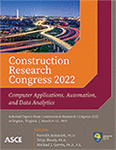Emergency Management in Smart Cities: Infrastructure-Less Communication Systems
Publication: Construction Research Congress 2022
ABSTRACT
Reliable communication is a critical component of a successful emergency management operation in resilient cities. However, large-scale extreme events may demolish telecommunication infrastructure. The current state of practice to maintain communication when telecom infrastructure are not available heavily depend on expensive equipment (e.g., transportable telecom towers and unmanned aerial networks) that may not be readily available everywhere. To address this issue, this study aims to develop theoretical foundations for a new framework that provides a fully decentralized infrastructure-less communication system using ad hoc mobile networks. The proposed framework uses device-to-device (D2D) wireless connection, distributed ledgers adopted from Blockchain technology, and a new all-to-all network broadcasting algorithm. The proposed infrastructure-less system collects critical spatial data from available cellphone devices in the affected area and shares it among all of them. At the end of this procedure, each device will have spatial information of all available devices. When emergency teams find a device through a D2D connection, they will actually have access to spatial data of all devices and can locate all people in one step.
Get full access to this article
View all available purchase options and get full access to this chapter.
REFERENCES
Ali, K., Nguyen, H. X., Vien, Q. T., Shah, P., and Chu, Z. (2018). “Disaster management using D2D communication with power transfer and clustering techniques” IEEE Access, 6, 14643–14654.
Aloi, G., Bedogni, L., Bononi, L., Briante, O., Di Felice, M., Loscrì, V., Pace, P., Panzieri, F., Ruggeri, G., and Trotta, A. (2015). “Stem-net: How to deploy a self-organizing network of mobile end-user devices for emergency communication.” Computer Communications, 60, 12–27.
Camps-Mur, D., Garcia-Saavedra, A., and Serrano, P. (2013). “Device-to-device communications with Wi-Fi Direct: overview and experimentation.” IEEE wireless communications, 20(3), 96–104.
Cheshire, S., Aboba, B., and Guttman, E. (2005). Dynamic configuration of IPv4 link-local addresses (Vol. 26). RFC 3927.
Erdelj, M., Król, M., and Natalizio, E. (2017). “Wireless sensor networks and multi-UAV systems for natural disaster management.” Computer Networks, 124, 72–86.
Furutani, T., Kawamoto, Y., Nishiyama, H., and Kato, N. (2018). “A novel information diffusing method with virtual cells- based Wi-Fi direct in disaster area networks.” IEEE Wireless Communications and Networking Con., Barcelona, Spain,1–6.
Federal Communications Commission. (2017). Communication status report for areas impacted by Hurricane Harvey August 26, 2017. Public Safety and Homeland Security Bureau.
Gallager, R. G., Humblet, P. A., and Spira, P. M. (1983). “A distributed algorithm for minimum-weight spanning trees.” ACM Transactions on Programming Languages and systems, 5(1), 66–77.
Gunaratna, G. T. C., Jayarathna, P. V. N. M., Sandamini, S. S. P., and De Silva, D. S. (2015). “Implementing wireless Adhoc networks for disaster relief communication.” Int. Con. on Ubi-Media Computing, Colombo, Sri Lanka, 66–71.
Ilbeigi, M. (2021). Infrastructure-less Communication. RISC Lab. GitHub Repository. <https://github.com/risc-lab/Infrastructure-less-Communication>.
Kamruzzaman, M., Sarkar, N. I., Gutierrez, J., and Ray, S. K. (2017). “A study of IoT-based post-disaster management.” Int. Con. on Information Networking, Da Nang, Vietnam, 406–410.
Mariani, J., Ottarson, S., and Xiao, L. (2018). “HSNet: Energy Conservation in Heterogeneous Smartphone Ad Hoc Networks.” Int. Con. on Computer Communication and Networks, Hangzhou, China, 1–9.
Pan, M. S., and Wang, C. M. (2019). “A group-less and energy efficient communication scheme based on Wi-Fi direct technology for emergency scenes.” IEEE Access, 7, 31840–31853.
Royer, E. M., and Toh, C. K. (1999). “A review of current routing protocols for ad hoc mobile wireless networks.” IEEE personal communications, 6(2), 46–55.
Shahin, A. A., and Younis, M. (2015). “Efficient multi-group formation and communication protocol for wi-fi direct.” IEEE Con. on Local Computer Networks, Clearwater Beach, FL, 233–236.
Toh, C. K. (2001). Ad hoc mobile wireless networks: protocols and systems. Pearson Education. Upper Saddle River, NJ.
Werbach, K. (2018). The blockchain and the new architecture of trust. MIT Press. Cambridge, MA.
Information & Authors
Information
Published In
History
Published online: Mar 7, 2022
Authors
Metrics & Citations
Metrics
Citations
Download citation
If you have the appropriate software installed, you can download article citation data to the citation manager of your choice. Simply select your manager software from the list below and click Download.
